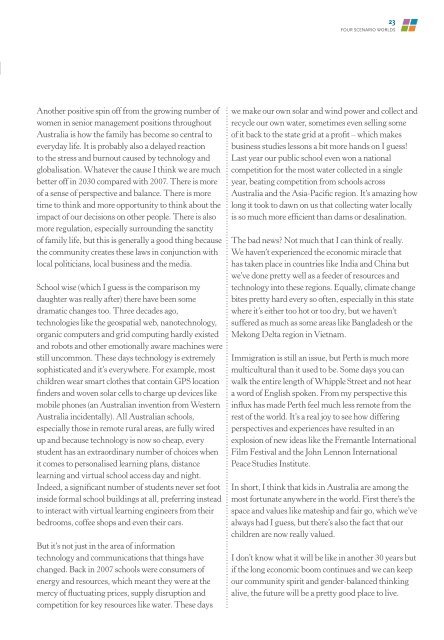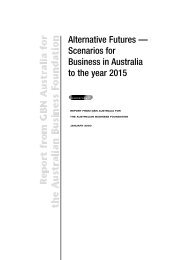Teaching for uncertain futures - Neville Freeman Agency
Teaching for uncertain futures - Neville Freeman Agency
Teaching for uncertain futures - Neville Freeman Agency
You also want an ePaper? Increase the reach of your titles
YUMPU automatically turns print PDFs into web optimized ePapers that Google loves.
23four scenario worldsAnother positive spin off from the growing number ofwomen in senior management positions throughoutAustralia is how the family has become so central toeveryday life. It is probably also a delayed reactionto the stress and burnout caused by technology andglobalisation. Whatever the cause I think we are muchbetter off in 2030 compared with 2007. There is moreof a sense of perspective and balance. There is moretime to think and more opportunity to think about theimpact of our decisions on other people. There is alsomore regulation, especially surrounding the sanctityof family life, but this is generally a good thing becausethe community creates these laws in conjunction withlocal politicians, local business and the media.School wise (which I guess is the comparison mydaughter was really after) there have been somedramatic changes too. Three decades ago,technologies like the geospatial web, nanotechnology,organic computers and grid computing hardly existedand robots and other emotionally aware machines werestill uncommon. These days technology is extremelysophisticated and it’s everywhere. For example, mostchildren wear smart clothes that contain GPS locationfinders and woven solar cells to charge up devices likemobile phones (an Australian invention from WesternAustralia incidentally). All Australian schools,especially those in remote rural areas, are fully wiredup and because technology is now so cheap, everystudent has an extraordinary number of choices whenit comes to personalised learning plans, distancelearning and virtual school access day and night.Indeed, a significant number of students never set footinside <strong>for</strong>mal school buildings at all, preferring insteadto interact with virtual learning engineers from theirbedrooms, coffee shops and even their cars.But it’s not just in the area of in<strong>for</strong>mationtechnology and communications that things havechanged. Back in 2007 schools were consumers ofenergy and resources, which meant they were at themercy of fluctuating prices, supply disruption andcompetition <strong>for</strong> key resources like water. These dayswe make our own solar and wind power and collect andrecycle our own water, sometimes even selling someof it back to the state grid at a profit – which makesbusiness studies lessons a bit more hands on I guess!Last year our public school even won a nationalcompetition <strong>for</strong> the most water collected in a singleyear, beating competition from schools acrossAustralia and the Asia-Pacific region. It’s amazing howlong it took to dawn on us that collecting water locallyis so much more efficient than dams or desalination.The bad news? Not much that I can think of really.We haven’t experienced the economic miracle thathas taken place in countries like India and China butwe’ve done pretty well as a feeder of resources andtechnology into these regions. Equally, climate changebites pretty hard every so often, especially in this statewhere it’s either too hot or too dry, but we haven’tsuffered as much as some areas like Bangladesh or theMekong Delta region in Vietnam.Immigration is still an issue, but Perth is much moremulticultural than it used to be. Some days you canwalk the entire length of Whipple Street and not heara word of English spoken. From my perspective thisinflux has made Perth feel much less remote from therest of the world. It’s a real joy to see how differingperspectives and experiences have resulted in anexplosion of new ideas like the Fremantle InternationalFilm Festival and the John Lennon InternationalPeace Studies Institute.In short, I think that kids in Australia are among themost <strong>for</strong>tunate anywhere in the world. First there’s thespace and values like mateship and fair go, which we’vealways had I guess, but there’s also the fact that ourchildren are now really valued.I don’t know what it will be like in another 30 years butif the long economic boom continues and we can keepour community spirit and gender-balanced thinkingalive, the future will be a pretty good place to live.



